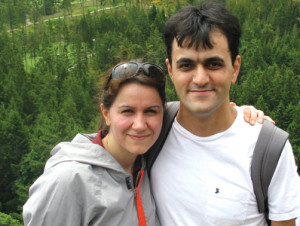
The Supreme Court of the Islamic Republic has overridden the death sentence handed down to Canadian resident Saeed Malekpour, but will not free him or allow a new trial, instead sentencing him to life in prison, believed to be the harshest sentence ever given an Iranian expatriate by Iran.
Malekpour, 38, was convicted of running a pornographic website, with evidence being the fact that his name appeared in the credits on the website. His family said Malekpour ran no such website but designed some software that many website managers had bought. The credit line on the pornographic website was for the software the website had bought, the family has said.
Malekpour’s lawyer, Mahmud Alizadeh-Tabatabai, told the Mehr news agency how Malekpour’s case was handled in the Supreme Court. It was a somewhat tortuous decision. First, Tabatabai said, the Supreme Court upheld the death sentence on review. Then it recognized that Malekpour had repented and requested mercy. Accepting the repentance, the Supreme Court than granted clemency and converted the death sentence to a life sentence.
He has already spent 4 1/2 years in prison.
Malekpour, an Iranian-born man with permanent residency in Canada but not citizenship, was arrested in December 2008 while visiting his ailing father in Iran.
The computer programmer, who lived in Toronto with his wife, was accused of operating a pornographic website.
Canada and several rights groups petitioned for his release. Amnesty International said the software program created by Malekpour for general use in posting photos to the Internet was used to post pornographic images unbeknownst to Malekpour.
In 2010, the Islamic Republic convicted Malekpour of three counts of “designing and moderating pornographic websites” and “insulting the sanctity of Islam.”
The Canadian government protested Malekpour’s incarceration, saying he did not receive “fair and transparent legal treatment.” But Canada had limited grounds on which to act since Malekpour does not hold Canadian citizenship. But, even if he did, the Islamic Republic does not recognize foreign naturalizations of Iranians.
Malekpour’s lawyer told the Mehr news agency last December that his client had repented for his actions and, therefore, the death sentence would be rescinded. “We now hope that my client will receive a reduced sentence,” the lawyer was quoted as saying in December.
It was unknown why Malekpour was convicted, let alone given such a harsh sentence. There was speculation Malekpour suffered from the bottomless pit into which Iranian-Canadian relations have plummeted. Iran is even more hostile to Canada than the United States.
Relations began a precipitous fall after dual Iranian-Canadian national Zahra Kazemi died from a presumed beating in Evin prison 10 years ago. Canada soon began sponsoring the annual UN resolution condemning Iranian human rights compliance. In recent years, Tehran has produced huge quantities of propaganda denouncing Canada for human rights abuses, especially against aborigines.
